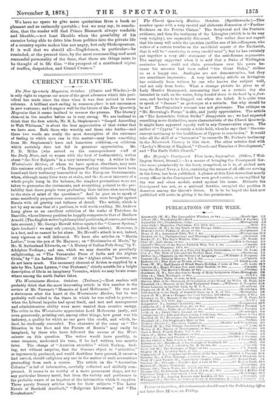CURRENT LITERATURE.
The New Quarterly Magazine, October. (Chatto and Windus.)—It is only right to express our sense of the great advances which this peri- odical has made since the time when it was first noticed in these columns. A brilliant start ending in common-place is not uncommon in new ventures; and it augurs well for the future of the New Quarterly Magazine that it seems inclined to reverse the process. The literary element in the number before us is very strong. We are inclined to think that the first article, Mr. R. L. Stephenson's "Gospel According to Walt Whitman," is about the beat appreciation of that writer that we have seen. Both those who worship and those who loathe—and these two words are really the most descriptive of the extremes of feeling to which men run in this matter—may learn something from Mr. Stephenson's keen and humorous criticism,—a criticism which certainly does not fail in generous appreciation. Mr. F. D. Miller (who served on the correspondence staff of the Daily News, and so comes with the best of testimonials), writes about "the New Bulgaria" in a very interesting way. A writer in the Westminster Review, of whom we have spoken elsewhere, may note this sentence with profit :—" In European Turkey witnesses have been heard and their testimony transmitted to the European Governments, when, although many lives were at stake, and the dearest interests of a whole people hung in the balance, the simplest precautions were not taken to guarantee the statements, and everything pointed to the pro- bability that these people were graduating their informition according to the state of mind of the questioner." And he goes on to speak of some manifestly preposterous accusations which were brought against Russia with all gravity and fullness of detail. The article, which is not by any moans that of a partisan, is well worth reading. Mr. Andrew Lang gives us an excellent criticism of the works of Theodore de Banville, whose literary position he happily compares to that of Matthew Arnold. (The English writer's philosophical position is, of course, not taken into account.) Mr. George Howell writes against the " Caucus System." Quis laudavit? we may ask (except, indeed, the author). However, it is a fact, and so cannot be let alone. Mr. Howell's attack is not, indeed, very vigorous or well delivered. We have also articles on "Martin Luther," from the pen of Dr. Hayman ; on "Dictionaries of Music," by Mr. H. Sutherland Edwards, on "A History of Italian Folk-Song," by T. Adolphus Trollope ; and one, which we may describe as peculiarly enlightening, on "The Vernacular Press of India and the Afghan Crisis," by "An Indian Editor." Of the "Afghan crisis," however, we do not learn much. The necessary element of fiction is supplied by a tale by Mrs. Lynn Lynton," Our Professor," chiefly notable for a bright description of life in an imaginary Veronica, which we may locate some- where among the north Italian lakes.


































 Previous page
Previous page